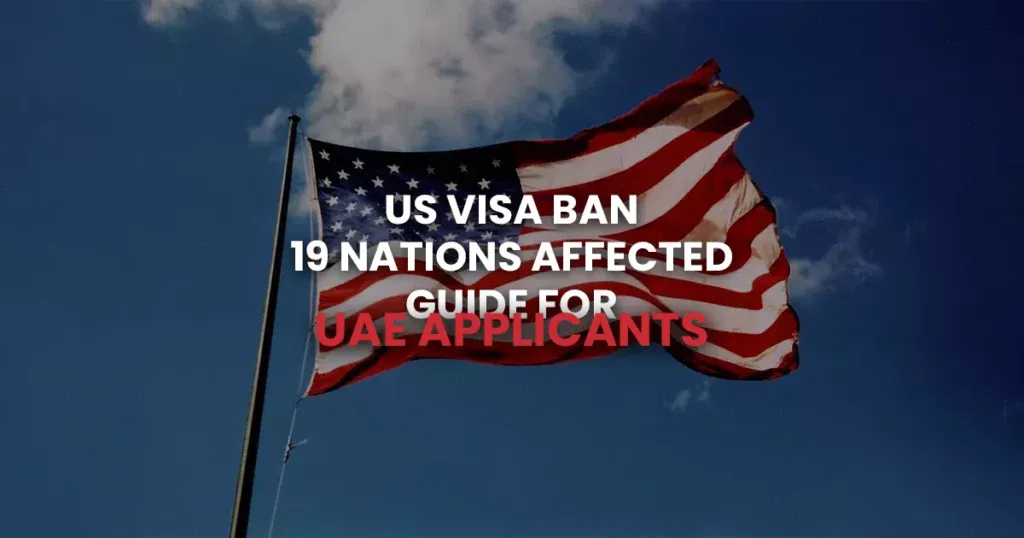If you are in the UAE and thinking about applying for a US visa, hold that thought for now. Since last Monday, June 9, a big travel restriction has come into play, and many will be scrambling to change travel plans. The US Visa Ban, yes, that phrase is in the news again, became official for nationals of 19 countries. Whether a summer trip, study abroad, or reunion, this could change the game very much.
Now, let’s break it down. What this means, who it applies to, and what those living in the UAE should know before they set that embassy appointment, their once-in-a-lifetime trip to the USA.
Why the Ban Anyway? A Move by “National Security”

The new restrictions come under a Presidential Proclamation to enhance national security by making the visa-screening process much stronger. It reflects a 2017 controversy, the travel ban first introduced under the Trump administration, which drew chains of outcry and legal actions.
Now, in 2025, the idea is back, and it’s presumably broader. Although the official line states it is about security and documentation standards, critics would describe it as another top-down exclusion. In other words, for regular travelers, it simply means no visa, no entry.
Who’s Affected? Citizens of 19 Countries Hit With Restrictions

The US Visa Ban affects applicants who were outside the US and without a valid visa as of Monday morning. That means if your visa was already approved and in your hands before June 9, you’re safe, for now. But if you’re in the process of applying or were planning to apply soon, the outlook depends heavily on your passport.
Let’s break it down:
Full US Visa Freeze – 12 Countries
If you’re a citizen of any of the following 12 nations, the door to the US is effectively shut for both immigrant and non-immigrant visas:
- Afghanistan
- Burma (Myanmar)
- Chad
- Republic of the Congo
- Equatorial Guinea
- Eritrea
- Haiti
- Iran
- Libya
- Somalia
- Sudan
- Yemen
Applicants from these countries, even those residing in the UAE, will now face a US visa ban unless they qualify for specific exemptions (we’ll get to those).
Partial Visa Restrictions – 7 Countries
For the following 7 countries, the restrictions are a bit more nuanced, but still significant. Categories like tourist (B1/B2), student (F, M, J), and immigrant visas are now heavily restricted:
- Burundi
- Cuba
- Laos
- Sierra Leone
- Togo
- Turkmenistan
- Venezuela
Even if you’re applying from inside the UAE, obtaining one of these passports puts you at high risk of denial unless you’re an exception.
Exceptions: Who Still Has a Shot?
There are a few narrow pathways still open under the US Visa Ban. These exemptions apply to specific groups of individuals, even if they are from the restricted countries:
- Immediate family members of US citizens (spouses, children, parents)
- Current Green Card holders (LPRs)
- US government employees and Special Immigrant Visa (SIV) holders
- Adopted children of US citizens
- Members of persecuted ethnic or religious groups in Iran
- Dual nationals applying with an unaffected passport
- Athletes participating in major international sports events
If you or somebody known to you qualifies for one of these categories, the issuance of a visa may still be possible, but with higher chances of severe scrutiny.
UAE Residents: What You Need to Do Now
In case you’re a resident of the UAE and hold a passport from one of the 19 affected countries, you should consider the following before embarking on your application for a US visa:
- Authenticate Eligibility: Don’t take anything for granted. Refer to the most current information on the official websites of either the US Embassy in Abu Dhabi or the US Consulate in Dubai.
- Do Not Waste Your Resources: Application fees, travel for consulate interviews, and documentation take time and money. If you’re affected, you could lose both.
- Keep Yourself Informed: Restrictions may change, keep watch on any possible legal challenges, diplomatic negotiations, or new proclamations.
- Consult an Attorney: Get in touch with an immigration attorney who is familiar with US requirements if the situation is complicated (for example, dual nationality, family petition, humanitarian cases).
What Comes Next?
Although the US government maintains that the proclamation is one of security, international reactions are already underway. Human rights activists have condemned the proclamation as discriminatory. Others have argued that such proclamations can compromise international cooperation and diplomatic relations with those countries with their own internal instabilities.
In the meantime, travelers, students, and families are left scrambling, especially those caught mid-process.
Final Thoughts
The US Visa Ban has once again placed immigration and travel in the spotlight. For UAE-based residents from the affected countries, the best move right now is to stay informed, act cautiously, and avoid making travel assumptions based on outdated information.
While some exceptions still allow access, the default setting is now denial unless exempted. With international mobility already recovering post-pandemic, this sweeping restriction is a stark reminder of how fast the rules can change, and how critical it is to stay ahead of them.
Before you apply for that US visa, take a pause. Check your status, confirm your eligibility, and only proceed if you’re sure the door is still open.

